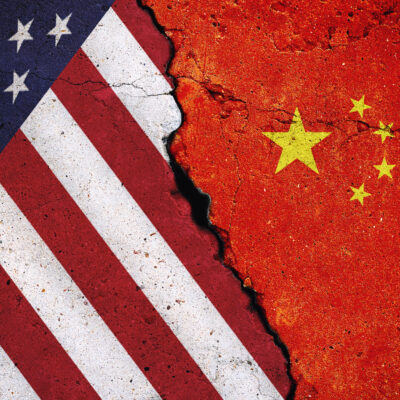

If Republicans are serious about confronting China, they need to sideline members who aren’t
Recommended Reading
Last fall’s conflict among House Republicans over whether to restrict the flow of American investment into China (“outbound investment”) ended in a ceasefire. Speaker Mike Johnson sent the warring parties—China hawks Mike Gallagher and Michael McCaul and doves Patrick McHenry and Andy Barr—off to find a compromise by the end of the first quarter, and talks have been ongoing ever since. Evidence of progress is sparse.
The fundamental problem in the negotiation seems to be that only one side wants to achieve progress at all. If the parties were trying to agree how best to restrict outbound investment, a deal could surely be reached. But McHenry, chair of the House Financial Services Committee, has emphasized repeatedly that he opposes the very concept of investment restriction. To the contrary, he believes that the United States should be promoting greater investment in China, especially into sensitive sectors. In a letter to Secretary of the Treasury Janet Yellen, he argued:
If we oppose China’s state-run economy, we want more private investment – not less. Of those private investors, we want more of them to be Americans – not fewer. And if we are truly concerned by China’s technology companies, we want as many Americans as possible steering them, spreading Western standards, and complying with U.S. laws.
On outbound investment, McHenry occupies the role of the open-borders Democrats, purportedly a “stakeholder” whose interests must be served, but in fact an impediment whose objective runs counter to the premise of the exercise.
This dynamic is reminiscent of the one that hamstrung the bipartisan “negotiations” on immigration. How were the parties supposed to craft an effective border-security bill when one side opposed the very concept of restricting entry into the country? On outbound investment, McHenry occupies the role of the open-borders Democrats, purportedly a “stakeholder” whose interests must be served, but in fact an impediment whose objective runs counter to the premise of the exercise.
The best that McHenry and Barr will offer on behalf of the financial services community—er, committee—is narrowly targeted sanctions on specific Chinese companies. Sanctions are necessary, but far from sufficient in the context of a state-run economy controlled by an authoritarian, communist regime. Under President Xi Jinping’s “Military-Civilian Fusion” strategy, the U.S. State Department has warned, “the CCP is acquiring the intellectual property, key research, and technological advancements of the world’s citizens, researchers, scholars, and private industry in order to advance military aims.” Sanctions cannot narrowly target the People’s Liberation Army (PLA) when the entire economy is oriented toward supporting the PLA. As American Compass and the Heritage Foundation argued in a coalition letter signed by a number of prominent conservative organizations and scholars:
While we strongly support enhancing and more sensibly harmonizing the U.S. sanctions regime, sanctions alone are piecemeal and backwards-looking, rather than comprehensive and preventative. Predictability, efficiency, and efficacy all favor broad, robust prohibitions as the default.
With the clock ticking, the absurdity of McHenry’s position and the case for action continues to grow clearer. Earlier this month, the House’s Select Committee on the Strategic Competition Between the United States and the Chinese Communist Party, which Gallagher chairs, released a blockbuster report on “How American Venture Capital Fuels the PRC Military and Human Rights Abuses.” In scrutinizing just a handful of U.S. venture capital firms, it found more than $3 billion in investments flowing to “PRC technology companies that facilitate human rights abuses including genocide, contract with the Chinese military, or strengthen the PRC’s semiconductor supply chains and advance China’s national security ambitions.” Developments in the semiconductor industry are illustrative:
U.S. dollars and expertise helped the PRC build Semiconductor Manufacturing International Corporation (SMIC), a company critical to the PRC’s semiconductor advancement and to the PLA. … The United States bars the export of sensitive technology to companies like SMIC—but it does not bar U.S. investors from funding the next SMIC, just as U.S. dollars and expertise proved foundational to SMIC itself over more than two decades.
Beyond capital, the report notes, outbound investments from the U.S. into China “help PRC companies go global,” “provide PRC companies with invaluable mentorship and management expertise,” “help PRC companies find, develop, and hire talent,” and “give PRC companies credibility and help them find and engage with co-investors and industry partners.” Sanctions address none of this, and often arrive long after the damage has been done. The 2019 blacklisting of SenseTime for facilitating human rights abuses came too late to prevent Qualcomm Ventures from helping build it, according to the report. In 2021, the venture capitalists were still offering the sanctioned SenseTime a hearty congratulations for “creat[ing] a better #AI empowered future through #innovation.”
The fundamental question is how the United States manages its relationship with China; considerations of how Wall Street provides its financial services are secondary at best.
House leadership needs to side clearly with the House Foreign Affairs Committee (chaired by McCaul) and the Select Committee (chaired by Gallagher) on the imperative of implementing outbound investment restrictions, rejecting the inclination of the House Financial Services Committee to prioritize investor profits and the ease of doing business with our nation’s primary adversary. The fundamental question is how the United States manages its relationship with China; considerations of how Wall Street provides its financial services are secondary at best.
Of course, input from the Financial Services Committee should be welcome, provided it comes from a starting point of acceptance that restricting investment is in fact the goal. But the Republican Party cannot claim to be serious about confronting the China challenge while someone promoting investment maintains a seat at the table, let alone a veto. If McHenry still doesn’t understand the game, he should be sent to the bench. There’s still time left in the quarter to get the ball down the field.
Recommended Reading
A Hard Break from China
Protecting the American Market from Subversion by the CCP
Halting Investment in China
Oren Cass discusses why America must disentangle from China to protect its market from subversion by the CCP.
Coalition Letter: Outbound Investment Restrictions
As the FY2024 National Defense Authorization Act (NDAA) moves through conference committee, we write to urge Congress’s support for security-related restrictions on outbound investment of American capital to the People’s Republic of China (PRC).













